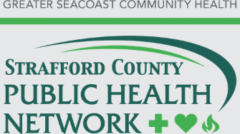Public Health Emergency Preparedness (PHEP) is the capacity a community has to address health emergencies of several types. PHEP utilizes public health and heath care partners to prevent and respond to emergencies and build a network of individuals and organizations who act as a community's support system during public health emergencies.

Emergencies
We Handle
- Epidemics/Pandemics
- Chemical, biological, and radioactive exposures resulting from natural, accidental, or terrorism-related event
- Outbreaks such as Hepatitis A
The Public Health Network role in Emergency Preparedness
Guidance: Annual evidence-based guidance to ensure state and local jurisdictions have the most current information to better protect their communities
Technical Assistance: Operational know-how to ensure state and local public health departments are ready to respond
Evaluation: Measurement and evaluation of our region's capability to prepare for any public health emergency

The Strafford County Public Health Network is taking active steps to prevent the spread of COVID19, and inform and educate our community members about the best ways to avoid getting sick, or spreading sickness. Watch the short video below, and explore this page to learn some of the basics about COVID19.
Visit our COVID19 Pages for more information:
Learn the basics:
The Center for Disease Control (CDC) has a hub of information about COVID19.
Visit their site to stay up to date on COVID19.
How COVID19 Spreads
Person-to-person spread
The virus is thought to spread mainly from person-to-person.
- Between people who are in close contact with one another (within about 6 feet).
- Through respiratory droplets produced when an infected person coughs or sneezes.
These droplets can land in the mouths or noses of people who are nearby or possibly be inhaled into the lungs.
Can Someone Spread COVID19 Without Being Sick?
- People are thought to be most contagious when they are most symptomatic (the sickest).
- Some spread might be possible before people show symptoms; there have been reports of this occurring with this new coronavirus, but this is not thought to be the main way the virus spreads.
Spread from contact with contaminated surfaces or objects
It may be possible that a person can get COVID-19 by touching a surface or object that has the virus on it and then touching their own mouth, nose, or possibly their eyes, but this is not thought to be the main way the virus spreads.
How easily the virus spreads
How easily a virus spreads from person-to-person can vary. Some viruses are highly contagious (spread easily), like measles, while other viruses do not spread as easily. Another factor is whether the spread is sustained, spreading continually without stopping.
The virus that causes COVID-19 seems to be spreading easily and sustainably in the community (“community spread”) in some affected geographic areas.
Watch For Symptoms
Reported illnesses have ranged from mild symptoms to severe illness and death for confirmed coronavirus disease 2019 (COVID19) cases.
The following symptoms may appear 2-14 days after exposure.*



Call Your Doctor if you...
Develop symptoms, and have been in close contact with a person known to have COVID19
Have recently traveled from an area with widespread or ongoing community spread of COVID-19.
What to do if you are sick
There is currently no vaccine to prevent coronavirus disease 2019 (COVID-19). The best way to prevent illness is to avoid being exposed to this virus. However, as a reminder, CDC always recommends everyday preventive actions to help prevent the spread of respiratory diseases, including:
- Avoid close contact with people who are sick.
- Avoid touching your eyes, nose, and mouth.
- Stay home when you are sick.
- Cover your cough or sneeze with a tissue, then throw the tissue in the trash.
- Clean and disinfect frequently touched objects and surfaces using a regular household cleaning spray or wipe.
- Follow CDC’s recommendations for using a facemask.
- Facemasks should be used by people who show symptoms of COVID-19 to help prevent the spread of the disease to others. The use of facemasks is also crucial for health workers and people who are taking care of someone in close settings (at home or in a health care facility).
- Wash your hands often with soap and water for at least 20 seconds, especially after going to the bathroom; before eating; and after blowing your nose, coughing, or sneezing.
- If soap and water are not readily available, use an alcohol-based hand sanitizer with at least 60% alcohol. Always wash hands with soap and water if hands are visibly dirty.
For information about handwashing, see CDC’s Handwashing website
For information specific to healthcare, see CDC’s Hand Hygiene in Healthcare Settings
These are everyday habits that can help prevent the spread of several viruses. CDC does have specific guidance for travelers.
COVID19 in New Hampshire
The New Hampshire Department of Health and Human Services (NH DHHS) is providing information about the current status of COVID19 in NH:
Want to get involved?
Public Health Emergency Preparedness takes many forms, and volunteers are a vital part of the response team. Volunteers of various backgrounds can serve their community through help with everything from assisting during community drills, to spreading the word about Emergency Preparedness at events.
For Healthcare providers:
- NH Responds is New Hampshire's system for advance volunteer registration for emergencies - great resource to get involved in PHEP.
For Individuals, organizations and anyone looking to get involved:
- Contact us at SCPHN@GoodwinCH.orgto learn more about getting involved in you community's Public Health Network.
